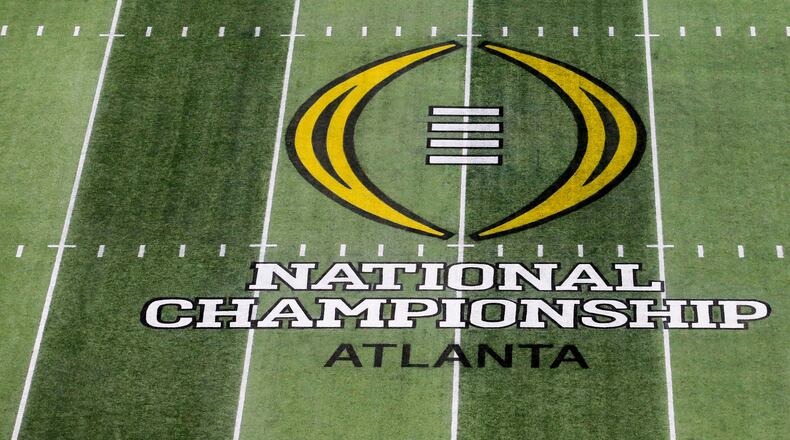LOS ANGELES — Less than a year from now, Atlanta will be on the clock to host college football’s national-championship game.
It will be the first city to repeat as host of the College Football Playoff title game, and it will be the first to hold the championship in the expanded 12-team format.
A total of five members from the Atlanta Sports Council, Mercedes-Benz Stadium, the Georgia World Congress Center and the Peach Bowl were in Los Angeles last week to meet with CFP officials and do due diligence in the days before Georgia defeated TCU 65-7 in the title game. There are lessons learned from Atlanta’s first go-round and possible changes needed to be made with the game being held at a later date (Jan. 20) to accommodate the expanded field. Houston is scheduled to host the game following the 2023 season, on Jan. 8, before turning over the game to Atlanta.
“After the announcement, shortly they started talking about expansion, and we were like, ‘OK, what does that mean?’” Atlanta Sports Council President Dan Corso said while sitting in the lobby of a hotel in Los Angeles last week. “Well, so you can imagine, there were a lot of phone calls and meetings to kind of look at what-ifs. So we started looking, and (we’re) just really thankful that it worked out for the 20th. We’ve got a great setup for then. It really won’t be anything different than what we were going to have on Jan. 6.”
The date change won’t affect the city too much as host because of the abundance of hotel rooms, which are continuing to increase in numbers, and the size of venues such as the Georgia World Congress Center, which at 3.9 million square feet is large enough to accommodate any events related to the championship as well as pre-booked conventions, according to Corso.
The expansion from four teams to 12 will mean plenty for fan bases. They will have to budget and plan for as many as four games, up from two, the semifinal and final, in the current four-team format. Corso said he doesn’t think that increasing the number of games will result in a decreased attendance for Mercedes-Benz Stadium, which can accommodate more than 78,000 people. He said that Atlanta being the center of two power conferences, the SEC and the ACC, and the self-proclaimed center of the college football universe also will help.
“I think no matter how many they have, Atlanta is just going to have a good matchup because one, we’re surrounded by great college football programs all over the Southeast, but we’re also easily accessible to Big Ten schools, and even teams out in the West,” Corso said.
“Flexibility is key, and so is affordability to get there, whether you want to drive or fly. So I think all of that combined, no matter the size of the playoff, how many teams they have, I think Atlanta is always going to be suited very well for a good matchup.”
Atlanta and Mercedes-Benz Stadium last hosted the championship game in 2018 to end the 2017 season. Alabama defeated Georgia on Jan. 8 in front of an announced attendance of 77,430, which was the second-largest championship crowd in CFP history.
Things didn’t go as well as the hosts hoped.
A combination of rain and President Donald Trump’s decision to attend contributed to waits of as long as two hours to get into the billion-dollar venue.
“It was awesome,” CFP Executive Director Bill Hancock said the day after the game. “From top to bottom, the people of Atlanta were wonderful hosts. Yes, they had a curveball thrown at them with the visit by the President of the United States.”
While there were a few negatives then, there should be some positives for the 2025 game. It is scheduled to be played on Martin Luther King Jr. Day. Because some businesses will be closed to honor the civil rights leader, that should help thin Atlanta’s notorious traffic. Corso said he hopes that they can do some things to tie together the game and Atlanta’s history of civil rights.
Corso also pointed to improvements to State Farm Arena, which could serve as a host for concerts or other fan-related events, and the Hilton Signia, a large hotel under construction beside the World Congress Center and scheduled to open in 2024, as changes that have been made since the title game was last here.
“So a lot of things have developed in that short time period that we can add to the mix of experience,” Corso said. “So yeah, we scored very well across the board with the CFP.”
As far as lessons learned from Los Angeles, Corso said he appreciated how the city held fan events at Banc of California Stadium, home of MLS team LAFC, last week. The site is near USC and downtown Los Angeles, which made it easier for fans of Georgia and TCU to get there and prompted Corso to point out how unique Atlanta is with regard to its larger venues. He also liked how the city honored public school teachers, which Atlanta did in 2018 and likely will do again in 2025.
“We are really lucky in the fact that we are so compact that you don’t have to get on shuttle buses to drive 20 miles or 20 minutes and 30 minutes away to go to some function,” he said. “And the media don’t have to get on shuttles to come downtown or go wherever we want. It’s all walkable. And there’s only a handful of cities in the U.S. that can offer that.”
The hope is that if Atlanta can host in 2025 as well as it hosted in 2018, that it will become part of a select rotation.
“There’s a lot of cities they can go to,” Corso said. “They would like to move it around. But I do think the warm-weather cities are beneficial, given the game date. So that puts us right in the heart of that rotation. So you figure, perhaps some time at the latter part of the decade, early part of 2030. Who knows? It’d be cool. It’s a great market for it.”
About the Author
Keep Reading
The Latest
Featured

